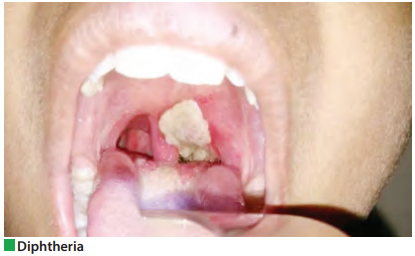Diphtheria is an infectious disease caused by the bacteria Corynebacterium diphtheriae. It primarily affects the upper respiratory tract, resulting in severe throat infections and potentially leading to life-threatening complications. Despite being rare in most developed countries due to widespread immunisation efforts, diphtheria remains a significant concern in certain regions, posing dangers to public health.
Causes of diphtheria
Diphtheria is caused by the bacterium Corynebacterium diphtheriae, which produces a toxin responsible for the infection’s characteristic symptoms. The bacteria can be transmitted from person to person through respiratory droplets or direct contact with infected individuals. It can also survive on contaminated surfaces, enabling indirect transmission.
The symptoms include:
Foreigners taking our jobs because we lack skills, youth minister laments
I was bullied as a child because of my voice – Tems
A thick, gray membrane covering the throat and tonsils.
A sore throat and hoarseness.
Swollen glands (enlarged lymph nodes) in the neck.
Difficulty breathing or rapid breathing.
Nasal discharge.
Fever and chills then tiredness.
Nigeria has recorded diphtheria outbreaks in the past, notably in 2011 and 2022. In 2023, a previous outbreak of diphtheria was recorded between January and April 2023 affecting 21 of the 36 states and the Federal Capital Territory (FCT).
Moreover, since January 2023, Kano State has reported over 9, 613 confirmed cases of diphtheria in the state. Although there was a decline in the reported case in June, however, as of July, the diphtheria cases rose again.
Data from the Nigeria Centre for Disease Control and Prevention (NCDC) show that 12, 086 confirmed cases and 577 deaths from diphtheria have been recorded so far.
Risk Factors
– Lack of immunisation: Individuals who have not received the diphtheria vaccine or have received incomplete immunisation are at a higher risk of contracting and spreading the infection.
-Crowded living conditions: Diphtheria is more likely to spread in environments where people live closely together, such as refugee camps or areas with poor sanitation.
– Age: Children and adolescents who have not received proper immunization are typically more susceptible to diphtheria. However, adults can also be at risk if their immunity has waned over time.
Prevention Strategies
– Vaccination: The most effective strategy for preventing diphtheria is vaccination. The diphtheria vaccine is typically administered as part of the routine childhood immunization schedule, often in combination with tetanus and pertussis vaccines (DTaP or Tdap). Boosters are also recommended for adolescents and adults to maintain long-term immunity.
-Improved hygiene: Promoting good hygiene practices, such as regular hand washing with soap and water, can reduce the risk of transmission. Covering the nose and mouth when coughing or sneezing can also minimise the spread of respiratory droplets.
– Isolation and treatment: Prompt identification, isolation, and treatment of diphtheria cases, along with contact tracing, can help prevent further transmission.
Dangers to public health
-Severe Illness: Diphtheria can cause severe throat infections, resulting in the formation of a thick grayish membrane that can obstruct the airway and lead to difficulty breathing, suffocation, and death if left untreated.
-Complications: Even with treatment, diphtheria can lead to serious complications, including myocarditis (inflammation of the heart muscle), nerve damage, paralysis, kidney problems, and respiratory failure.
-Potential resurgence: In areas with low vaccination rates or during emergencies, outbreaks of diphtheria can occur, posing a risk to public health. Inadequate access to healthcare and limited vaccination coverage contribute to the vulnerability of populations in certain regions.
Conclusively, diphtheria remains a significant public health concern in certain areas. Vaccination, improved hygiene practices, and prompt treatment of cases are crucial for preventing its transmission.
Understanding the causes, implementing preventive measures, and ensuring widespread immunisation coverage are essential to mitigate the risks diphtheria poses to public health and prevent potential resurgences of the disease. I urge the Nigerian government to do the needful in order to tackle the disease.
Gurama is a fellow of doctoral degree, writing from Faculty of Pharmaceutical Sciences, Gombe State University.

 Join Daily Trust WhatsApp Community For Quick Access To News and Happenings Around You.
Join Daily Trust WhatsApp Community For Quick Access To News and Happenings Around You.


